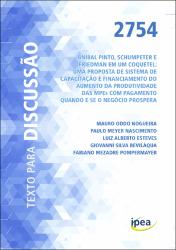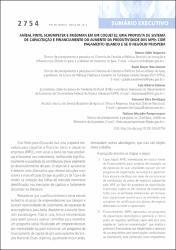Please use this identifier to cite or link to this item:
https://repositorio.ipea.gov.br/handle/11058/11112Full metadata record
| DC Field | Value | Language |
|---|---|---|
| dc.contributor.author | Nogueira, Mauro Oddo | - |
| dc.contributor.author | Nascimento, Paulo Meyer | - |
| dc.contributor.author | Esteves, Luiz Alberto | - |
| dc.contributor.author | Beviláqua, Giovanni Silva | - |
| dc.contributor.author | Pompermayer, Fabiano Mezadre | - |
| dc.coverage.spatial | Brasil | pt_BR |
| dc.date.accessioned | 2022-04-01T15:48:37Z | - |
| dc.date.available | 2022-04-01T15:48:37Z | - |
| dc.date.issued | 2022-03 | - |
| dc.identifier.uri | http://repositorio.ipea.gov.br/handle/11058/11112 | - |
| dc.description.abstract | Neste estudo, propõe-se um sistema integrado para apoiar a qualificação gerencial e o financiamento para micro e pequenas empresas (MPEs), com papéis complementares sendo desempenhados pelas próprias empresas, pelo governo e por agentes financiadores/investidores. Trata-se de regular um mercado hoje inexistente, baseado em um tipo de financiamento que transformou a assistência estudantil na Austrália e na Inglaterra e que vem conquistando espaço na literatura sobre financiamento público. Nos financiamentos com pagamentos vinculados à renda futura, quem financia recebe uma proporção da renda, do faturamento ou dos lucros futuros da pessoa ou da firma que é financiada, como reembolso de um empréstimo ou como remuneração pelo investimento feito. Para viabilizá-lo, propõe-se uma nova Contribuição de Intervenção no Domínio Econômico (Cide). Recorre-se a uma espécie tributária para que as economias de escala e de escopo envolvidas no poder estatal de tributar sejam direcionadas à remoção de falhas no mercado de capitais. Isso tende a ensejar benefícios sociais superiores aos benefícios privados eventualmente auferidos, justificando o envolvimento de um novo tributo como meio de as MPEs beneficiadas reembolsarem seus financiadores. O recolhimento dessa Cide vincula-se ao faturamento da MPE ou à renda de seus sócios, caso haja encerramento das atividades da MPE com dívida ainda pendente. Assim, reduzem-se os riscos de não pagamento, aumentando as garantias para quem financia, e esvazia-se de conteúdo jurídico o instituto da inadimplência, protegendo as MPEs e seus sócios dos imprevistos que caracterizam os negócios. Atrela-se a elegibilidade ao financiamento a uma prévia capacitação gerencial, tendo como produto um plano de negócios a ser certificado por entidade externa à instituição que ofereceu a formação. O plano de negócios certificado funciona, portanto, como uma espécie de “carta de recomendação” a ser levada às instituições financeiras credenciadas à concessão do crédito. Em certa medida, a proposta combina três correntes do pensamento econômico bastante distintas entre si: o estruturalismo, a abordagem schumpeteriana e o liberalismo. Recorre, particularmente, a elementos dessas correntes trabalhados, respectivamente, por Aníbal Pinto, Joseph Schumpeter e Milton Friedman – daí a menção expressa a esses pensadores no título deste estudo. | pt_BR |
| dc.language.iso | pt-BR | pt_BR |
| dc.publisher | Instituto de Pesquisa Econômica Aplicada (Ipea) | pt_BR |
| dc.title | Aníbal Pinto, Schumpeter e Friedman em um coquetel : uma proposta de sistema de capacitação e financiamento do aumento da produtividade das MPEs com pagamento quando e se o negócio prospera | pt_BR |
| dc.title.alternative | Texto para Discussão (TD) 2754 : Aníbal Pinto, Schumpeter e Friedman em um coquetel : uma proposta de sistema de capacitação e financiamento do aumento da produtividade das MPEs com pagamento quando e se o negócio prospera | pt_BR |
| dc.type | Texto para Discussão (TD) | pt_BR |
| dc.rights.holder | Instituto de Pesquisa Econômica Aplicada (Ipea) | pt_BR |
| dc.source.urlsource | http://www.ipea.gov.br | pt_BR |
| dc.location.country | BR | pt_BR |
| dc.description.physical | 56 p. : il. | pt_BR |
| dc.subject.vcipea | IPEA::Administração de Empresas. Produtividade | pt_BR |
| dc.subject.vcipea | IPEA::Administração de Empresas. Produtividade::Gestão. Administração::Gestão. Administração::Administração de Empresas | pt_BR |
| dc.subject.vcipea | IPEA::Administração de Empresas. Produtividade::Empresas::Empresas::Pequenas Empresas | pt_BR |
| dc.subject.vcipea | IPEA::Administração de Empresas. Produtividade::Empresas::Empresas::Financiamento de Empresas | pt_BR |
| dc.rights.license | É permitida a reprodução deste texto e dos dados nele contidos, desde que citada a fonte. Reproduções para fins comerciais são proibidas. | pt_BR |
| dc.subject.keyword | Micro e Pequenas Empresas | pt_BR |
| dc.subject.keyword | Empreendedorismo | pt_BR |
| dc.subject.keyword | Financiamento | pt_BR |
| dc.subject.keyword | Instrumentos de Crédito | pt_BR |
| dc.subject.keyword | Políticas Públicas | pt_BR |
| dc.subject.keyword | Empréstimo Contingente à Renda | pt_BR |
| dc.subject.keyword | Income Share Agreements | pt_BR |
| ipea.description.additionalinformation | Série monográfica: Texto para Discussão ; 2754 | pt_BR |
| ipea.description.additionalinformation | Possui referências bibliográficas | pt_BR |
| ipea.access.type | Acesso Aberto | pt_BR |
| ipea.rights.type | Licença Comum | pt_BR |
| ipea.englishdescription.abstract | We propose an integrated public-private system designed to improve the pre-finance capabilities of micro and small enterprises (MSE), thereafter assisting them with finance to foster their innovation and/or expansion plans. The idea is to regulate a market standing on income-contingent financing, an important social innovation that has transformed student financing in Australia and England and has been increasingly discussed in the literature on public financing as an improvement over previous mechanisms for funding investment in several other areas besides education. Income-contingent financing implies that the side providing the funds receives back a proportion of the future income, revenue, or profits of the person or firm being funded, as repayment of a loan or as remuneration for an investment made. Given that the proposal presented in this paper focuses on firms, we will refer to the mechanism as revenue-contingent financing. To make such an arrangement viable in Brazil, a new tax is needed. The new tax is the way to involve the federal revenue system in the repayment collection, thus taking advantage of the economies of scale and scope involved in the State’s power to tax in order to remove failures in the capital market. The removal of such market failures leads to social benefits greater than the private benefits eventually earned, justifying the introduction of a new tax to collect revenue-contingent repayments. The proposed arrangement reduces the risks of non-repayment, increasing the guarantees for those who provide finance. As repayments occur only if and when the firm’s revenue is greater than a predetermined level, revenue-contingency also insures firms against negative shocks. In our proposed system, eligibility for financing is linked to a previous managerial training, at the end of which entrepreneurs shall submit a business plan, and this must be certified by an independent agency outside the institution where the managerial training took place. The certified business plan then works as a kind of “recommendation letter” to be taken to accredited financial institutions for the granting of either debt or equity revenue-contingent instruments. To some extent, this proposal combines three strands of economic thought that are quite distinct from each other: structuralism, the Schumpeterian approach, and liberalism. It relies, in particular, on elements risen by Aníbal Pinto, Joseph Schumpeter and Milton Friedman – that is the reason why these three thinkers are mentioned in the title of this paper. | pt_BR |
| ipea.researchfields | N/A | pt_BR |
| ipea.classification | Economia. Desenvolvimento Econômico | pt_BR |
| ipea.classification | Pequenas, Médias e Grandes Empresas | pt_BR |
| Appears in Collections: | Pequenas, Médias e Grandes Empresas: Livros | |
Files in This Item:
| File | Description | Size | Format | |
|---|---|---|---|---|
| td_2754.pdf | 1.96 MB | Adobe PDF |  View/Open | |
| td_2754_sumex.pdf | 818.88 kB | Adobe PDF |  View/Open | |
| publicacao_preliminar_td_anibal_pinto.pdf | 884.31 kB | Adobe PDF |  View/Open |
Items in DSpace are protected by copyright, with all rights reserved, unless otherwise indicated.

